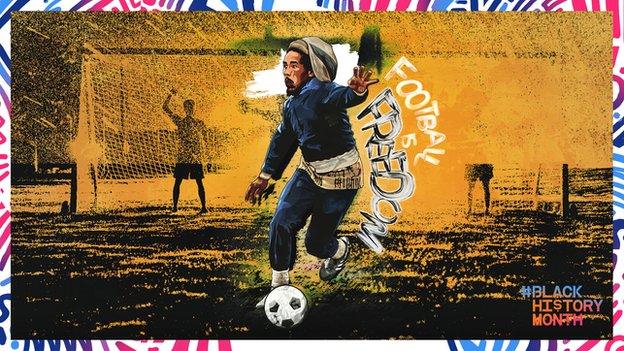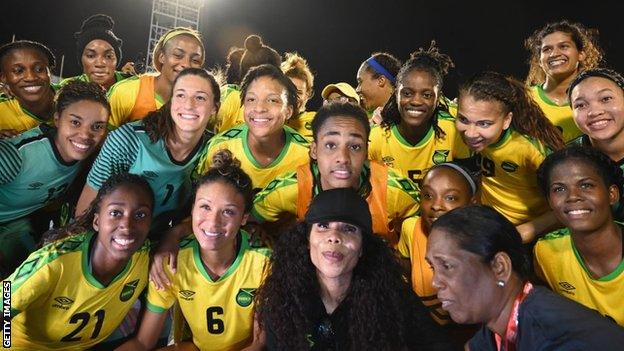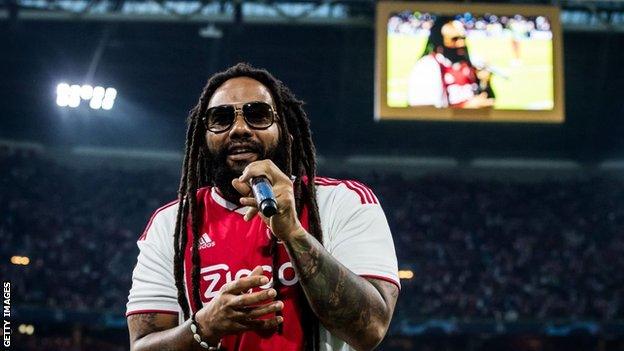Black History Month: Bob Marley's love affair with football
- Published

Bob Marley was born in Jamaica in 1945, but died in 1981 aged just 36
"If you want to get to know me, you will have to play football against me and the Wailers."
That's what Bob Marley once told a journalist. And he meant it.
We know him as singer, a song-writer, a pioneer of Reggae and a cultural icon. But did you know that football was as important to Bob Marley as music?
BBC Sport has spoken to two of Marley's close friends, celebrity chef Levi Roots and photographer Dennis Morris, about his love for the sport.
'Football is freedom'
Allow Instagram content?
This article contains content provided by Instagram. We ask for your permission before anything is loaded, as they may be using cookies and other technologies. You may want to read Meta’s Instagram cookie policy, external and privacy policy, external before accepting. To view this content choose ‘accept and continue’.
Bob Marley was never far from a football. Whenever he got the chance, he would have a kickabout - whether that was in between studio sessions, before he went on stage, or playing in the park with his friends.
The beautiful game gave him a release from his music, allowing him to tap into the more competitive side of his personality.
In an interview in 1980, he said: "I love music before I love football. If I love football first it maybe can be dangerous. I love music and then football after. Playing football and singing is dangerous because the football gets very violent. I sing about peace, love and all of that stuff, and something might happen y'know. If a man tackle you hard it bring feelings of war."
"Watching him play football was magical," Morris, Marley's photographer and close friend, told BBC Sport: "I never really took photos of him while he played football because I really just wanted to watch him play. Because it was his joy, and it was the only time he had to relax, so that was really when I would put the camera down."
Marley was a fan of Brazilian club side Santos FC, but also supported English side Tottenham Hotspur. The Three Little Birds singer was a fan of Spurs' Argentine midfielder Ossie Ardiles, who played for the club from 1978 for a decade.
Roots describes defending against Marley in a friendly game at Battersea Park in London in the mid-70s: "He was so focused. With the ball at his feet, running at you and his main aim is to get past you, then to shoot. He was a master. Of both of his passions."
Marley died in 1981, four years after reportedly discovering a form of skin cancer under a toe, external during a game of football.
His daughter helped save the women's Jamaican national team

Cedella Marley (bottom, centre in black cap), Bob Marley's daughter, poses with the Jamaica Women's football team 'Reggae Girlz' in May 2019
In 2018 the Jamaican women's national football team - the 'Reggae Girlz' - made history by qualifying for their first women's football World Cup, held in France.
That was in large part due to the financial backing of Cedella Marley - Bob's daughter, chief executive officer of her late father's record label and fashion designer.
She became the team's ambassador in 2014 alongside the Bob Marley foundation and, with the team in major financial trouble, started to invest her own money.
Cedella told BBC Sport in 2018 her father "would probably not be surprised, when I put my foot into something, stuff happens. He'd be like, 'that's my girl'."
How one of Bob Marley's most famous songs became an Ajax FC chant

Ky-Mani Marley, son of Bob Marley, singing Three Little Birds during a Champions League game at the Johan Cruyff Arena in 2018
In the summer of 2008, Cardiff City played Ajax FC in their final pre-season friendly. After the game, Ajax fans were kept seated in the away stand until the Cardiff fans had left the surrounding area.
The announcer at the now-demolished Ninian Park Stadium, Ali Yassine, was instructed to play music to help keep Ajax fans calm, and being a huge reggae fan, chose "Three Little Birds" by Bob Marley..
The story goes that Ajax fans started dancing, clapping, and chanting the songs' lyrics; and it became Ajax's anthem. In 2018, Bob Marley's son Ky-Mani Marley attended an Ajax game and was given the honour to perform "Three Little Birds" at the Johan Cruyff Arena at half time - with the home crowd fans singing along with him.
Bob Marley - An undisputed style icon
Allow Instagram content?
This article contains content provided by Instagram. We ask for your permission before anything is loaded, as they may be using cookies and other technologies. You may want to read Meta’s Instagram cookie policy, external and privacy policy, external before accepting. To view this content choose ‘accept and continue’.
Whenever Marley was off stage he was always dressed like he was ready to pick up a football and start playing right there on the spot.
Constantly seen in photos wearing classic football tracksuits and numerous different football jerseys - varying from the Jamaican national team to Brazil's signature yellow home kit - it's fair to say his love for football shone through in his attire.
You would find him head to toe in cotton sweats when playing in the UK, with his socks tucked into his worn Adidas Copa Mundial signature boots.
However, when in Jamaica you would see Marley sporting his classic 70s shorts and T-shirt combo.
Allow Instagram content?
This article contains content provided by Instagram. We ask for your permission before anything is loaded, as they may be using cookies and other technologies. You may want to read Meta’s Instagram cookie policy, external and privacy policy, external before accepting. To view this content choose ‘accept and continue’.
Allow Instagram content?
This article contains content provided by Instagram. We ask for your permission before anything is loaded, as they may be using cookies and other technologies. You may want to read Meta’s Instagram cookie policy, external and privacy policy, external before accepting. To view this content choose ‘accept and continue’.

New drama - Roadkill: Can a government minister outrun the secrets of his past?
Bringing Football Back: Behind the scenes of a club reborn
